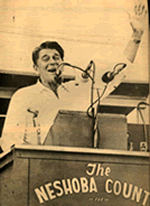Actual Historian Looks at Reagan in Mississippi
After several rounds in the New York Times pages and blog mentions beyond count, an historian who has actually studied Mississippi, Civil Rights and the rise of Ronald Reagan weighs in:
“Throughout his career, Reagan benefited from subtly divisive appeals to whites who resented efforts in the 1960s and 70s to reverse historic patterns of racial discrimination. He did it in 1966 when he campaigned for the California governorship by denouncing open housing and civil rights laws. He did it in 1976 when he tried to beat out Gerald Ford for the Republican nomination by attacking welfare in subtly racist terms. And he did it in Neshoba County in 1980.
Reagan knew that southern Republicans were making racial appeals to win over conservative southern Democrats, and he was a willing participant. Despite what Brooks claims, it’s no slur to hold Reagan accountable for the choice that he made. Neither is it mere partisanship to try to think seriously about the complex ways that white racism has shaped modern conservative politics.
Throughout his career, Reagan benefited from subtly divisive appeals to whites who resented efforts in the 1960s and 70s to reverse historic patterns of racial discrimination. He did it in 1966 when he campaigned for the California governorship by denouncing open housing and civil rights laws. He did it in 1976 when he tried to beat out Gerald Ford for the Republican nomination by attacking welfare in subtly racist terms. And he did it in Neshoba County in 1980.
Reagan knew that southern Republicans were making racial appeals to win over conservative southern Democrats, and he was a willing participant. Despite what Brooks claims, it’s no slur to hold Reagan accountable for the choice that he made. Neither is it mere partisanship to try to think seriously about the complex ways that white racism has shaped modern conservative politics.”
Joseph Crespino
